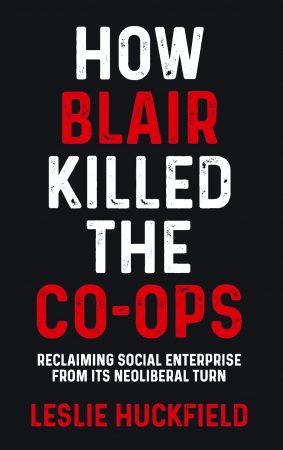How Blair killed the co-ops: Reclaiming social enterprise from its neoliberal turn, Les Huckfield, Manchester University Press, £80
Besides instilling ideas of self-help and mutuality into co-operative ideas, Dr William King urged steering clear of government involvement; it could possibly corrupt co-operatives’ operations. This advice was followed. In the 19th century, co-operatives mostly limited themselves to observing governments’ legal and taxation requirements. This later widened to include direct political action and they accepted increased government direction in both world wars.
In more recent times of benefits, loans and grants, co-operatives have moved closer to government. But in this new study, Les Huckfield claims that “under New Labour this almost killed them”.
Although this a sweeping statement, it is well and convincingly argued – helped by his long and successful political and academic careers and being based on his Ph.D thesis. Dr Huckfield focuses on New Labour’s policies on social enterprise, suggesting that these were shaped by neoliberalism favouring a market economy, increased privatisation and reduced state involvement. However they sat uneasily with fringe economic and social questions. To help deal with these, Labour decided that they comprise a sector of community and social enterprise. It emphasised social and community enterprises and downplayed co-operatives.

In this account, Blair set the scene with a breakfast meeting with co-op leaders. He told them “in the nicest possible way” what the policy would be. After that they were taken into another room where an unnamed lady “put her very pointed stiletto heels in and made it quite clear what was and what was not to be counted within social enterprise … social welfare expectations, with public and social values, [would be] replaced by value for money, impact and output measurement and cost of delivery”.
Dr Huckfield describes what followed in massive detail. Lessons from older established co-operatives were ignored, one being their acceptance of a market economy. From the time of the Rochdale Pioneers they had geared their practices to offset its exploitation. Their self help and mutual trade produced surpluses which were then spent on mutual benefits. Another lesson that New Labour overlooked but which ran deep in co-operative development was the need for potential members to learn organisational skills as well as those of their rights and responsibilities.
The book also explores various initiatives under New Labour’s social enterprise policy. I cringed when he mentioned an official of one scheme describing how £50m had been awarded to 39 neighbourhood schemes but he feared that they were not using this money quickly enough. He also noted that they had difficulties in agreeing what they wanted to do and were apparently “dazzled in the headlights”.
Dr Huckfield goes a little further back when tracing related developments from the 1960s. These include the emergence of the Industrial Common Ownership Movement, the Benn co-operatives and the setting up of the Cooperative Development Agency. In response to New Labour’s proposals, he describes various representations made by the Co-operative Party, Co-operative Union and later Co-operatives UK, generally reflecting unease. He also explores research into the social enterprise sector by co-operative academics including Spear, Yeo, Birchall and Ridley-Duff and found that they offered a variety of approaches and conclusions. Useful comparisons are also made with social enterprise developments in North America and Europe.
All these elements go to make a big book at the big price of £80. Hopefully it will become available from public libraries. It is a major contribution to co-operative literature. It shows how co-operatives were downgraded because New Labour associated them too closely with Old Labour. Dr Huckfield places this on par with its dropping of Clause 4. Without knowing this, I had become increasingly concerned that co-operatives seemed to be too often an afterthought to community and social enterprises. I found these amorphous, lacking cohesive principles and formulae such as co-operatives had developed. Moreover they had a much shorter history than co-operatives and lacked their immense literature.
Co-operatives must fight back. Dr Huckfield shows how such a need has arisen. In claiming that Labour’s policies were shaped by neoliberalism we also need to decide how to oppose that. Hopefully the ICA’s ongoing attempts to strengthen the co-operative identity will help.
Finally I welcome Dr Huckfield’s book because it is a major contribution to co-operation’s massive literature. It is groundbreaking in revealing that even in a western democracy like Britain governments can corrupt co-operatives. Hats off to Dr. King.